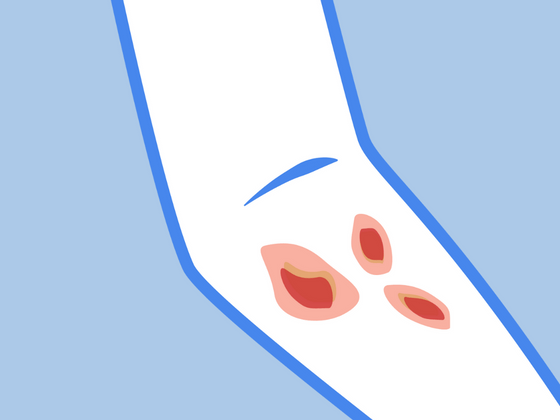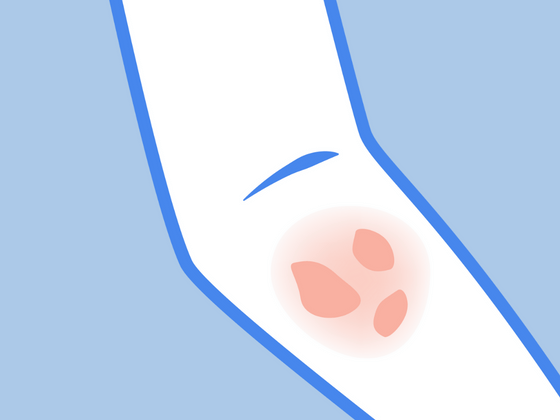In our first post of this series, Eczema 101: What is Eczema, we discussed the symptoms and different varieties of the skin condition. This post is all about the different factors that cause eczema triggers and aggravate the symptoms.
Please keep in mind that although these tips and information have worked for several sufferers, we are in no way medical professionals. If you’re experiencing severe symptoms or have a topical infection, it is always best to seek medical advice immediately.
How Did I Get Eczema?
If you suffer from eczema, this may be a question you’ve asked yourself at some point.
The truth is, there is no golden answer to the question. The exact cause of eczema is unknown, but research suggests that the skin condition is developed because of a combination of environmental and genetic factors.
For example, some children develop eczema because of family genes, while others experience flare-ups due to an overactive immune system that responds with inflammation when triggered by a substance outside or inside the body.
What Triggers Eczema?
Knowing what triggers your eczema is the first step to keeping your symptoms under control. However, when trying to identify what exactly is causing your eczema, it may be frustrating as there are a variety of possible irritants.
The trigger may be even harder to detect because there may also be a delayed reaction in a flare-up after exposure to an irritant. It’s also important to remember that eczema triggers may vary from person to person.
That being said, we’ve identified some common culprits - most of them everyday, household products. Let’s take a look at them:
Airborne allergens
Basically, anything in the environment can trigger an eczema flare-up: dampness, house dust mites, pet fur, pollen, and moulds. Other environmental factors, such as extreme hot or cold weather, can also play a role in triggering eczema. If asthma or sinus issues are a concern, using HEPA Air Purifiers can help provide relief.
Stress
Ah, stress. It can be a bit of a vicious cycle. Some people feel stressed because they have eczema which in turn only exacerbates their symptoms. It certainly is an emotional trigger that can be difficult to control.
Fortunately, there are some techniques that can be employed to reduce stress and overall, leave you feeling healthier and happier. Mindfulness, yoga, and meditation are some great stress-relieving strategies that we highly recommend you try if you aren’t already. To learn more, check out Does Stress Cause Eczema? How to Break the Cycle.
Fabric and Chemical Irritants
When the skin comes in contact with certain fabrics or chemicals, an eczema flare-up may ensue.
Many of these irritants are household products that you probably use on a daily basis, such as soaps, detergent for sensitive skin, and a variety of beauty products. This is because these products typically contain harsh chemicals that dry out your skin instead of nourishing it. Switching to eczema soap and other gentle cleansing products can help reduce irritation.
Common fabric irritants include latex, polyester, nylon and even wool. If you experience eczema symptoms after exposure to these fabrics, you may have textile dermatitis.
So when going shopping for new clothes, beauty products, or health-care products, remember that it’s extremely important to read the labels to be sure that there are no added chemical-based ingredients that can negatively affect your skin. The safer alternative is simply to use products with all-natural ingredients, such as natural eczema cream formulations.
Medication
It may sound surprising, but many oral and topical medications can trigger eczema in individuals. Examples include oral antibiotics, steroids, and birth control. These medications strip the gut of healthy bacteria which can lead to eczema.
Learn more about how antibiotics can negatively impact your gut’s microbiome here. If you are concerned about the medication you’re taking, speak to your physician as soon as possible.
Food Allergies/Sensitivities
Be careful what you eat! Because eczema develops due to inflammation, one of the biggest eczema triggers is actually food. Examples of foods that trigger eczema include dairy, eggs, and gluten. Acidic foods, spices, and nuts are also linked to triggering the skin condition.
That being said, everyone is different and will experience different reactions to these food products. Therefore, it’s crucial to understand your body, keeping in mind that there is a difference between a food allergy and a food sensitivity.
That’s why, while testing for a food allergy may be helpful, testing alone is usually not enough. We recommend undergoing an elimination diet to gain a better understanding of which eczema food triggers are causing your flare-ups.
Remember, always work with a dietician, nutritionist or physician when undergoing an elimination diet to make sure you or your child is still getting a healthy-well balanced diet full of essential nutrients.
To learn more about what triggers eczema, have a look at this video from dermatologist Dr. Peter Lio: What Triggers Eczema?
Stay tuned for next week’s post: Eczema 103: How to Heal Eczema Naturally.
Did you miss Eczema 101: What is Eczema?








